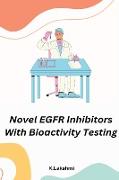- Start
- Novel EGFR Inhibitors with Bioactivity Testing
Novel EGFR Inhibitors with Bioactivity Testing
Angebote / Angebote:
The development of novel EGFR inhibitors with bioactivity testing has become an important area of research in cancer therapy. The epidermal growth factor receptor (EGFR) is a transmembrane protein that plays a key role in the regulation of cell proliferation, differentiation, and survival. Abnormalities in EGFR signaling have been linked to the development and progression of many types of cancer, making it an attractive target for cancer therapy.
In recent years, there has been a growing interest in the development of novel EGFR inhibitors that can overcome the limitations of currently available drugs. One approach has been the design and synthesis of new small molecules that can selectively inhibit the activity of EGFR, while minimizing the effects on normal cells. Several studies have focused on the design of novel EGFR inhibitors using computational techniques such as molecular docking, virtual screening, and structure-based design.
Once the novel EGFR inhibitors are synthesized, it is important to test their bioactivity to determine their effectiveness in inhibiting EGFR and their potential for use in cancer therapy. Bioactivity testing involves a series of experiments to evaluate the interaction of the inhibitor with the target receptor, as well as its effects on cancer cells. These tests provide valuable information about the potency, selectivity, and mechanism of action of the inhibitor.
One common method of bioactivity testing is the use of in vitro cell-based assays, which involve the incubation of cancer cells with the inhibitor and measuring the resulting effects on cell proliferation, apoptosis, and signaling pathways. These assays can provide information about the effectiveness of the inhibitor in inhibiting EGFR activity and its potential as a cancer therapeutic. Other in vitro assays such as enzyme activity assays, receptor binding assays, and western blotting can also be used to determine the bioactivity of the inhibitor.
In addition to in vitro assays, in vivo animal models can also be used to test the bioactivity of novel EGFR inhibitors. Animal models provide a more realistic environment to evaluate the effectiveness of the inhibitor in inhibiting EGFR activity and its potential as a cancer therapeutic. These tests can provide valuable information about the pharmacokinetics, toxicity, and efficacy of the inhibitor in vivo.
Overall, the development of novel EGFR inhibitors with bioactivity testing has the potential to significantly improve cancer therapy. By selectively targeting EGFR, these inhibitors can minimize the effects on normal cells and provide a more effective and targeted approach to cancer therapy. Bioactivity testing plays a critical role in the development of these inhibitors by providing valuable information about their effectiveness and potential for use in cancer therapy.
Folgt in ca. 15 Arbeitstagen


